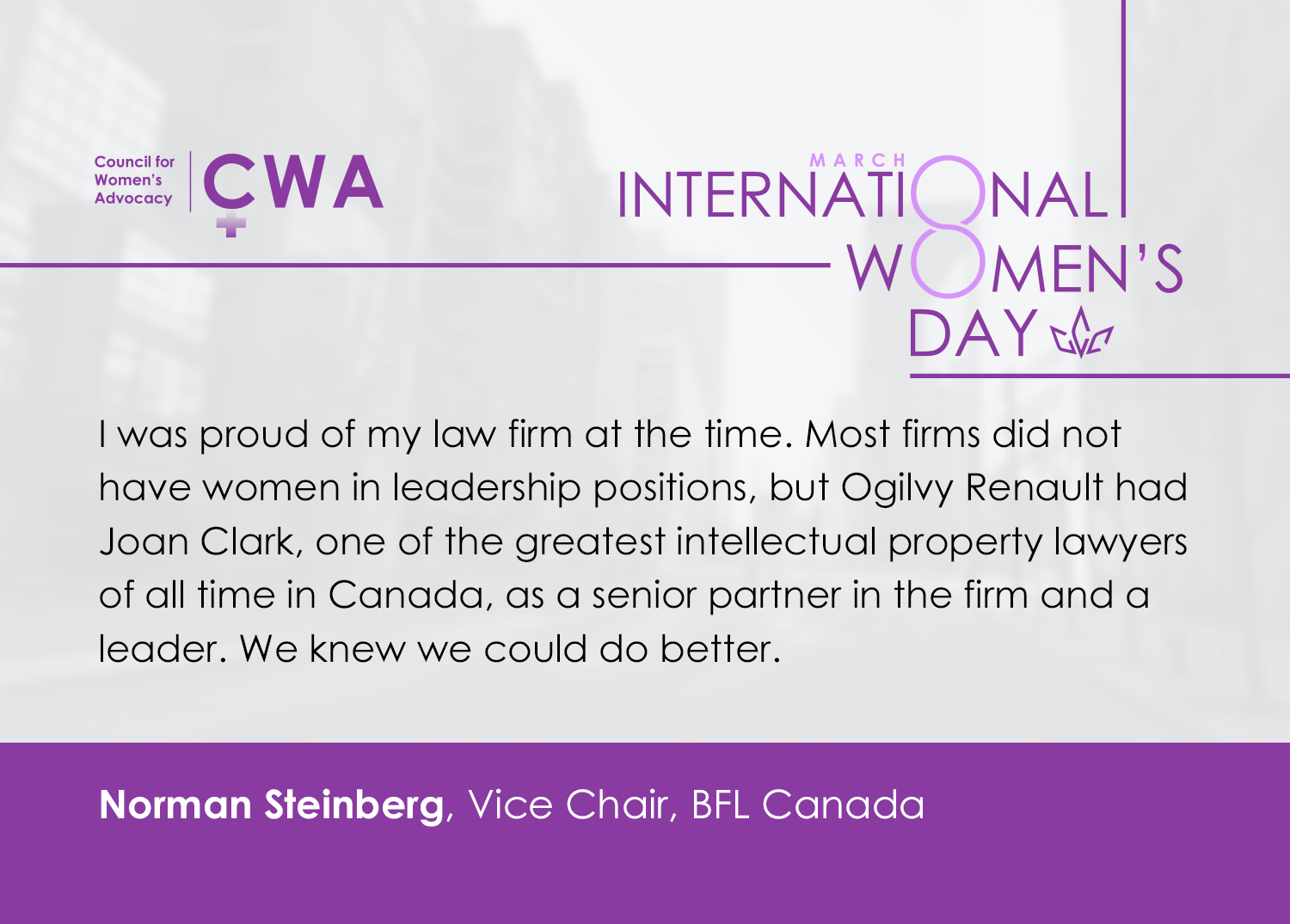Blog /
With Sound Economic Foundations, Good Policy is Apt to Move More Rapidly
With Sound Economic Foundations, Good Policy is Apt to Move More Rapidly
Working at the Montreal law firm of Ogilvy Renault in the late 1970s-80s, Norman Steinberg observed private clubs that turned women away from membership or...

Working at the Montreal law firm of Ogilvy Renault in the late 1970s-80s, Norman Steinberg observed private clubs that turned women away from membership or declined their entry through the front door to events to which they had been invited.
Steinberg was pleased that his law firm took leadership regarding this discrimination and asked the clubs to change their policies. Ogilvy Renault’s leverage was that if the policies were not changed, the firm would find other places to hold their events and cancel their memberships. Mr. Steinberg commented, “I was proud of my law firm at the time. Most firms did not have women in leadership positions, but Ogilvy Renault had Joan Clark, one of the greatest intellectual property lawyers of all times in Canada, as a senior partner in the firm and a leader. We knew we could do better.”
As a member of the Council for Women’s Advocacy (CWA), an initiative of the Canadian Chamber of Commerce, Mr. Steinberg thinks the Chamber is well positioned to tackle women’s issues given the Chamber’s grassroots footprint across Canada. Representing businesses large and small in communities large and small, the Chamber represents diversity in so many ways. “The Chamber is not the only one working at changing these issues but can play a critical role because of its broad membership. That the Chamber set up this council shows great leadership. To make changes, it will require a broad-based effort but we are one of the organizations to have the ability to move the agenda forward,” he said.
Recently, the CWA introduced five priority areas where the Council is advocating change by the government to support women in the workforce. Priorities of the CWA include childcare, women’s entrepreneurship and recovery funding for upskilling and reskilling of women.
Norman Steinberg believes that the CWA’s priorities will be more achievable if Canada can meet the urgent need for childcare. Living in Quebec, he is aware of the difference that subsidized childcare has made in that province. At the time it was set up, there was some criticism of the program but Steinberg considers that issues driven by economics help advance good policy. Case in point, Quebec’s ability to put more women into the workforce because of subsidized daycare meant that, pre-COVID, the province was leading in GDP growth. While there may be jurisdictional issues, if the federal government could be at the table to encourage the provinces to act on this key issue, success might occur sooner.
“COVID has affected women disproportionately more than men and that’s why we need to find ways to bring back women into the workforce.”
Over the course of his career, Norm has had the opportunity to work with young colleagues — to coach and mentor them. He says his motto is “Networking, networking, networking… as networking is a form of empowerment that expands a person’s reach for clients, learning and opportunities to grow into a career.” In addition, Steinberg believes it is important for women to find mentors that can help to understand the dynamics and the DNA of an organization. Men are still more aggressive in seeking out colleagues and cohorts that will propel them in their careers. Mentorship and networking can help alleviate some of these challenges.
We all have a role to play in breaking down the stereotypes. It is possible to break down barriers. For example, there are many women that work in engineering now that didn’t 20 years ago. As a society, we all need to be desensitized to roles as being gender-specific. It’s a learning curve for all humans.
The CWA is a cornerstone of the Canadian Chamber’s diversity and inclusion initiative, established to bring the voice and perspectives of women to national policies, inform the Canadian Chamber’s initiatives in advancing the gender equality agenda, and drive meaningful action to address the identified issues and barriers. The CWA will continue to explore recommendations that the federal government can implement to support women through the recovery period, alongside looking at best practices and guidance for the business community.
Other Blogs

Policy Matters: Revisiting the 3 Most Popular Topics of the Year

Vaccines: A Potential Key to Unlock Many of Canada’s Healthcare Challenges




